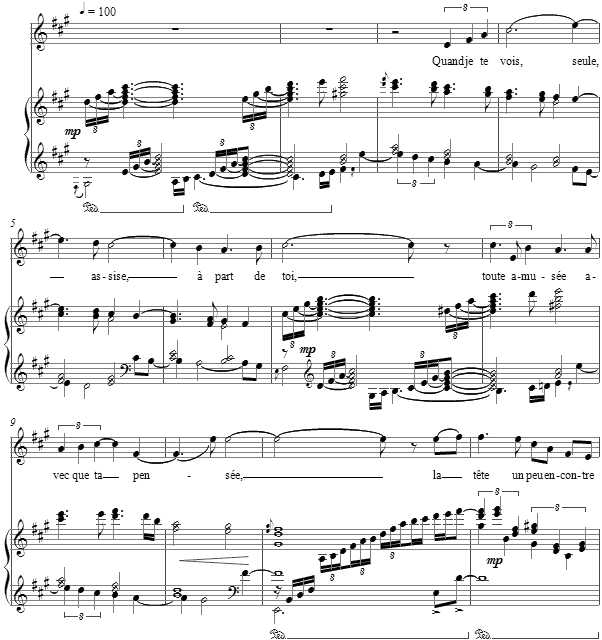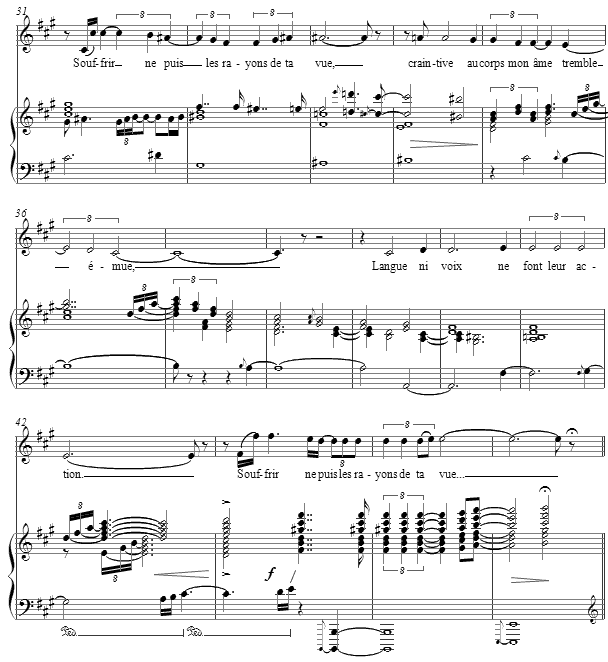Music and Texts of GARY BACHLUND
Vocal Music | Piano | Organ | Chamber Music | Orchestral | Articles and Commentary | Poems and Stories | Miscellany | FAQs
Quand je te vois - (2007)
Pierre de Ronsard
for mezzo soprano and piano
pour Mélanie Forgeron
Quand je te vois, seule, assise, à part toi,
Toute amusée avec que ta pensée,
La tête un peu encontre bas baissée,
Te retirant du vulgaire et de moi,
Je veux souvent, pour rompre ton émoi,
Te saluer, mais ma voix offensée
De trop de peur se retient amassée
Dedans ma bouche et me laisse tout coi.
Souffrir ne puis les rayons de ta vue,
Craintive au corps mon âme tremble émue,
Langue ni voix ne font leur action.
Seuls mes soupirs, seul mon triste visage
Parlent pour moi, et telle passion
De mon amour donne assez témoignage.Duration - 4 pages, circa 3' 15"
This poem of Pierre de Ronsard (1524-1585) , was first published 1552.
When I see you sitting alone, away from me,
wholly engrossed with your thoughts,
with your head somewhat lowered,
withdrawn from the crowd and from me,
then I often want to interrupt your mood,to greet you, but my weakened voice,
so fearful, holds itself back
in my mouth, leaving me mute.
I cannot stand the brilliance of your appearance;
my soul trembles, timid in my body;
with neither tongue nor voice to speak.
Only my sighs, only my sad expression
speak for me, but such passion
gives obvious evidence of my love.
While tempting to set this text in some darker mood, the sweet frustration of the speaker is pared with an aggressive enthusiasm for the object of that love. Therefore, the setting opens with a buoyant pyramid of arpeggios, and the chord forms are mostly of four voices, the seventh and the octave leaps in the voice reflected in the harmonies beneath. This is a love which is not requited in the moment, but which we have reason to be will be.
The upward-thrusting vocal leaps are answered with downward, step-wise motion, as if to weaken each instance of enthusiasm and passion. As the speaker makes a self-involved and frustrated complaint of the beloved's attractive proximity, the accompaniment yields up a greater dissonance by half step chromaticism and a dramatic half-cadence to the repetition of that complaint. Yet the setting ends with a recapitulation of the original intent, one of abiding hope overcoming the earlier self-absorption.
Mélanie Forgeron
Mélanie Forgeron was born in Nürnberg, where she studied violin and voice at the Conservatory there, and then at the Hochschule für Musik und Theater in Hannover. She has performed with the Nürnberger Symphony, at the Göttinger Händelfestspielen, in 2001 was a prize winner in the international Song Competition of the Kammeroper and received a Stipendium from the Richard-Wagner-Verbands, Hannover, and from the Yehudi Menuhin Foundation. After a guest engagement for Theater Lüneburg, she began her work in the ensemble of Theater Aachen, in such roles as Annio, Nerone and Charlotte.
The score is available as a free PDF download, though any major commercial performance or recording of the work is prohibited without prior arrangement with the composer. Click on the graphic below for this piano-vocal score.


